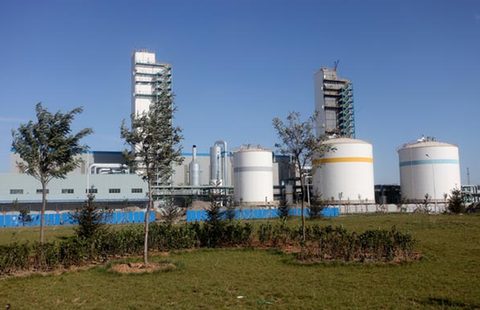RMB hub makes a splash
Updated: 2015-03-26 22:42
By LI NA in Toronto(China Daily Canada)
|
||||||||
 |
|
The Canadian RMB clearing center and trading hub in Toronto was officially launched on Monday. From left: William Zhu, the president and CEO of ICBC Canada; Charles Sousa, Ontario minister of finance; Luo Zhaohui, China's ambassador to Canada; Gu Shu, vice president of the Industrial and Commercial Bank of China; Joe Oliver, Canada's finance minister; Xue Bing, Chinese consul general in Toronto; and Victor Oh, Canadian senator from Ontario. LI NA / CHINA DAILY |
With a new designated renminbi clearing bank, it will now be easier for Canadian firms to make or receive payments in the Chinese currency, lowering costs and helping to create jobs in Canada.
On Monday, Toronto became North America's first renminbi clearing center and trading hub.
Gu Shu, senior vice president of the clearing bank — the Industrial and Commercial Bank of China (ICBC) — along with Joe Oliver, Canadian finance minister; Luo Zhaohui, China's ambassador to Canada; and other officials attended the center's launch on Monday evening.
Gu said that the center would use Canada's geographic and multiple time-zone advantages to support 24/7 clearing. For example, ICBC will provide clearing services when the headquarters and Singapore capital markets are closed.
The clearinghouse will allow Canadian companies to transact between Canadian dollars and Chinese RMB, or yuan, instead of using an intermediary currency such as the US dollar.
"Through lower transaction costs, it is now easier for Canadian firms to trade with and do business in China," said Oliver. "When you consider that the currency swap and options market sees an estimated daily turnover of US $24 billion, the hub offers a major cost advantage for Canadian firms doing business in China."
A recent study by the Canadian Chamber of Commerce estimated that allowing direct trade in the yuan could save Canadian firms up to C$6.2 billion (US$4.96 billion) over 10 years.
Toronto joins financial centers such as London, Paris, Frankfurt, Sydney, Singapore and Luxembourg that have signed similar deals to become RMB offshore centers and trading hubs.
"The innovative hub will enable Canadian businesses to save money and improve their productivity, stimulating economic growth and job creation in Ontario and across Canada," said Ontario Finance Minister Charles Sousa.
Gordon Houlden, director of the China Institute at the University of Alberta in Edmonton, said a business or bank in Quebec and Manitoba will be able to take advantage of this hub. "In addition to Toronto, there will be an operations unit in Vancouver. This will help with the time difference between the provinces in the eastern and western time zones," Houlden said.
There are benefits for Vancouver and British Columbia, too.
"British Columbia is always looking for ways to strengthen our cultural, economic and financial ties to Asia," BC Minister of Finance Michael de Jong said in a video during the ceremony. "Having a Canadian RMB hub allows us to continue to grow those ties in a meaningful way, and shows our continued commitment to maintaining a strong connection with one of our key export partners."
"It means savings in currency-exchange costs, reduction on transaction risks, as well as faster and more direct payments," Colin Hansen, president and CEO of Advantage BC, said during the ceremony. "There is no question that all the Canadian companies will benefit from this direct pipeline."
William Zhu, the president and CEO of the clearing bank, ICBC Canada, said at a panel discussion after the launch ceremony: "As the first RMB trading hub in North America, we will collaborate with other RMB offshore centers around the world, and contribute our efforts to make the center and hub successful."
He also signed the cooperation agreements and MOU with Canadian major banks including RBC, TD Bank, Scotia Bank, BMO and CIBC during the launch ceremony. "Without the support from the governments and peers from both sides, we won't make it happen today. There will be a long way to go," Zhu said.
Over the past two centuries, Canada and China have been deepening bilateral cultural and commercial ties. Today, more than 400 Canadian firms operate in China, and Canada has a nearly 1.5 million-strong Chinese-Canadian community — one of the largest overseas Chinese communities in the world.
Canadian exports to China have more than quadrupled since 2003, with two-way trade totaling $78 billion in 2014. Foreign direct investment between Canada and China has increased more than seven-fold between 2005 and 2013, to $21.5 billion.
China is now the largest trading nation in the world, and the renminbi is the fifth-largest global currency in terms of value of payments.
In 2013, the provincial government of British Columbia became the first foreign government to issue an offshore bond denominated in the yuan. The issuance of the one-year bond, nicknamed the "dim sum" bond for the Chinese cuisine that involves serving a variety of small delicacies, raised 2.5 billion yuan (C$502.9 million).
"China has attached great importance to our bilateral financial cooperation, and we have learned a lot from Canada," said Luo Zhaohui, China's ambassador to Canada. "The RMB clearing center in Toronto marks another important step forward. I hope our next step is on the establishment of the Asian Infrastructure Investment Bank."
Paul Weltzkin in New York contributed to this story.
renali@chinadailyusa.com

 Top 10 steel producers in China
Top 10 steel producers in China
 Highlights of China Fashion Week
Highlights of China Fashion Week Cockpit mystery emerges
Cockpit mystery emerges
 ISU figure skating worlds opens in Shanghai
ISU figure skating worlds opens in Shanghai
 Canola flowers form the emblem of harmony
Canola flowers form the emblem of harmony
 Your city in the shape of tiny round planet
Your city in the shape of tiny round planet
 Families mourn victims of Airbus A320 crash
Families mourn victims of Airbus A320 crash
 38,000 Brazilian troops to safeguard 2016 Rio Olympics
38,000 Brazilian troops to safeguard 2016 Rio Olympics
Most Viewed
Editor's Picks

|

|

|

|

|

|
Today's Top News
Germanwings' co-pilot 100 percent fit to fly: Lufthansa CEO
US invites Brazil's Rousseff for official visit
RMB hub makes a splash
US offers support to military action against Yemen's rebels
US sending Bill Clinton for Lee Kuan Yew's funeral
US military charges ex-Taliban captive Bergdahl
China, US work to clear legal hurdles
Cockpit voice recorder of crashed German plane found
US Weekly

|

|







